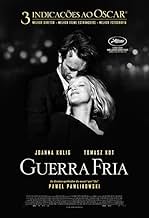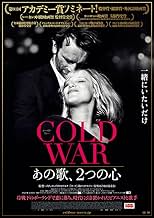IMDb-BEWERTUNG
7,5/10
63.216
IHRE BEWERTUNG
Eine leidenschaftliche Liebesgeschichte zwischen zwei schicksalhaft ungleichen Menschen von unterschiedlicher Herkunft und Persönlichkeit, vor dem Hintergrund des Kalten Krieges in den 1950e... Alles lesenEine leidenschaftliche Liebesgeschichte zwischen zwei schicksalhaft ungleichen Menschen von unterschiedlicher Herkunft und Persönlichkeit, vor dem Hintergrund des Kalten Krieges in den 1950er Jahren in Polen, Berlin, Jugoslawien und Paris.Eine leidenschaftliche Liebesgeschichte zwischen zwei schicksalhaft ungleichen Menschen von unterschiedlicher Herkunft und Persönlichkeit, vor dem Hintergrund des Kalten Krieges in den 1950er Jahren in Polen, Berlin, Jugoslawien und Paris.
- Für 3 Oscars nominiert
- 52 Gewinne & 125 Nominierungen insgesamt
Handlung
WUSSTEST DU SCHON:
- WissenswertesThe turbulent relationship between the main characters was inspired by the director Pawel Pawlikowski's real-life parents, who did break up and get together a couple of times, who moved from one country to another, and according to Pawlekowski, died together.
- PatzerWhen Wiktor crosses the border to West-Berlin in 1952, we can see on the horizon a high-rise with a rotating Mercedes-Benz star on the top. This is supposed to be the famous Europa-Center, but that was built in 1963 and only completed in 1965. It's probably poetic license to visually distinguish the capitalist West from the communist East.
- VerbindungenFeatured in Premios Goya 33 edición (2019)
- SoundtracksPukolem wololem
Performed by Tomasz Kicinski & Michal Mocek
Ausgewählte Rezension
Well, first off, the cinematography was not underrated. It is incredibly beautiful in a way that American Filmmakers have almost seemed to forget. We live in an era of cinema where color and computer graphics are our main tools for communicating at the theater. We want bigger (IMAX), louder/immersive (Atmos), and flashy/bright/color epileptic seizure inducing displays of digital fireworks.
Don't get me wrong. I love a movie that blends those things effectively, but there is a simple beauty to a black and white, 4x3 frame. The main thing I see in this sort of film is light. With no color to distract you, the emphasis of the film revolves around areas of light and dark.
The diffuse soft light of the cold air in winter and a stand of trees gains a mystical quality sometimes as the snow which clings to the dark trunks of trees seems to disappear into the distant fog. The hard light of a night club is seen for what it is, small sliver of light in a darkness that people long to disappear into and can't seem but help to be consumed by.
"Cold War" uses this light effectively as neither the star of the show nor a simple utilitarian instrument. It communicates an emotion that can't be portrayed through acting or production design alone.
The story is a classic one. A couple, torn apart by the love that binds them together and the forces of the world which conspire to keep them apart. Honestly, it's the main weakness of the film. I don't begrudge it that hard though. It was made by a Polish director and this is his own country's history and I'm sure there is a reason that that the war torn romance is a classic of literature and cinema. People identify with it.
In "Cold War," Zula is a young woman trying out for a Polish Heritage singing and dancing troupe. Wiktor is the director and, upon her first audition, he is intrigued by her. As they work together the troupe gains popularity till the state expresses interest in sponsoring the show. Wiktor doesn't like the control that the state is exerting over his art so he plots with Zula to escape Communist rule through Berlin.
They agree, but Zula gets cold feet and doesn't meet him at the rendezvous, opting instead to stay in Poland. The rest of the film revolves around a romance that only finds expression in passing as her career eventually takes her out of Poland and the the two of them reconnect and struggle with life abroad.
"Cold War" isn't a film for everyone. It's a little slow and reserved. The passion of their love is very muted, seeming more like passing interest at times than a fiery love affair and that makes it hard to connect with the characters at times.
Slow Cinema is seeing a bit of a resurgence right now, though, so it wouldn't be a bad idea to check out a highly acclaimed movie which exemplifies this style without falling into the trap of a 3 hour runtime as many slow cinema films do.
At a tight hour and a half, there are few people who can't afford to see something a little outside of their comfort zone. I certainly enjoyed it and more so even as I think about the film and the themes it presents once I left the theater.
Don't get me wrong. I love a movie that blends those things effectively, but there is a simple beauty to a black and white, 4x3 frame. The main thing I see in this sort of film is light. With no color to distract you, the emphasis of the film revolves around areas of light and dark.
The diffuse soft light of the cold air in winter and a stand of trees gains a mystical quality sometimes as the snow which clings to the dark trunks of trees seems to disappear into the distant fog. The hard light of a night club is seen for what it is, small sliver of light in a darkness that people long to disappear into and can't seem but help to be consumed by.
"Cold War" uses this light effectively as neither the star of the show nor a simple utilitarian instrument. It communicates an emotion that can't be portrayed through acting or production design alone.
The story is a classic one. A couple, torn apart by the love that binds them together and the forces of the world which conspire to keep them apart. Honestly, it's the main weakness of the film. I don't begrudge it that hard though. It was made by a Polish director and this is his own country's history and I'm sure there is a reason that that the war torn romance is a classic of literature and cinema. People identify with it.
In "Cold War," Zula is a young woman trying out for a Polish Heritage singing and dancing troupe. Wiktor is the director and, upon her first audition, he is intrigued by her. As they work together the troupe gains popularity till the state expresses interest in sponsoring the show. Wiktor doesn't like the control that the state is exerting over his art so he plots with Zula to escape Communist rule through Berlin.
They agree, but Zula gets cold feet and doesn't meet him at the rendezvous, opting instead to stay in Poland. The rest of the film revolves around a romance that only finds expression in passing as her career eventually takes her out of Poland and the the two of them reconnect and struggle with life abroad.
"Cold War" isn't a film for everyone. It's a little slow and reserved. The passion of their love is very muted, seeming more like passing interest at times than a fiery love affair and that makes it hard to connect with the characters at times.
Slow Cinema is seeing a bit of a resurgence right now, though, so it wouldn't be a bad idea to check out a highly acclaimed movie which exemplifies this style without falling into the trap of a 3 hour runtime as many slow cinema films do.
At a tight hour and a half, there are few people who can't afford to see something a little outside of their comfort zone. I certainly enjoyed it and more so even as I think about the film and the themes it presents once I left the theater.
- truemythmedia
- 10. Sept. 2019
- Permalink
Top-Auswahl
Melde dich zum Bewerten an und greife auf die Watchlist für personalisierte Empfehlungen zu.
- How long is Cold War?Powered by Alexa
Details
Box Office
- Budget
- 4.300.000 € (geschätzt)
- Bruttoertrag in den USA und Kanada
- 4.580.048 $
- Eröffnungswochenende in den USA und in Kanada
- 54.353 $
- 23. Dez. 2018
- Weltweiter Bruttoertrag
- 20.484.802 $
- Laufzeit1 Stunde 29 Minuten
- Farbe
- Sound-Mix
- Seitenverhältnis
- 1.37 : 1
Zu dieser Seite beitragen
Bearbeitung vorschlagen oder fehlenden Inhalt hinzufügen

Oberste Lücke
By what name was Cold War - Der Breitengrad der Liebe (2018) officially released in India in Hindi?
Antwort




































